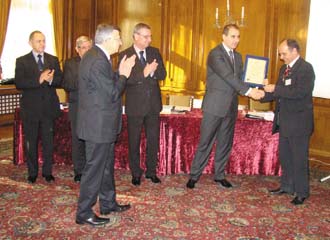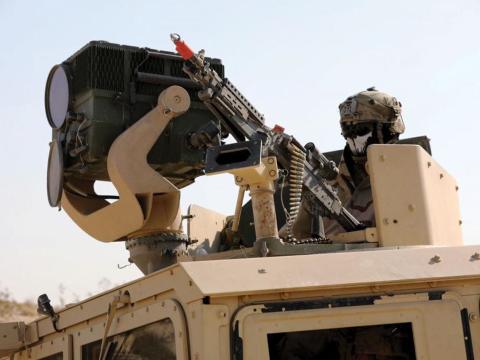Networking Keeps Business Moving in Bulgaria
Konstantin Zografov, regional vice president for the AFCEA Mediterranean and Black Sea Region, awards an honorary membership certificate to Bulgarian Deputy Prime Minister Tsvetan Tsvetanov during the AFCEA Sofia Chapter’s 2009 annual conference. Col. Simeon Atanasov Kralikov, BUAR (Ret.), founder and president of the Sofia Chapter, stands in front. Behind him are (l-r) Vice Adm. Emil Lyutskanov, BUNA (Ret.), Anyu Angelov, Bulgarian minister of defense, and Pavlin Dimitrov, Bulgaria’s deputy minister for the interior.
Southeast Europe is working through a tough economy to further defense and security solutions in the region. 
The Bulgarian government and the industry members who support it are battling to move the country’s federal technology forward as the worldwide economic downturn continues. Though times are difficult, public- and private-sector personnel are forming partnerships to advance programs crucial to military and other operations. Entities within the country as well as outside of it, including NATO, are coming together as part of these efforts. By keeping an eye on better times ahead, people in the nation’s information technology field hope to weather the storm and come out stronger on the other side.
One way in which a dynamic dialog about
Col. Simeon Atanasov Kralikov, BUAR (Ret.), founder of the AFCEA Sofia Chapter and its president for 17 years, explains that big projects in the information technology market have fallen in number, though next year the chapter anticipates that it might observe a slight growth. The financial problems facing Bulgaria and the world pose the biggest current difficulty for the Sofia Chapter, but other issues include the low level of understanding that companies have of AFCEA’s role, as well as the trouble members have making direct contacts with representatives of different authorities they meet at chapter events. “So the challenge for us is to explain to a wide audience the function and advantages of AFCEA as a [nongovernmental] and nonprofit organization,” Col. Kralikov says.
The Bulgarian market focuses on communications at the tactical level, but that has narrowed because of the financial crisis and lack of resources. One major command, control, communications, computers, intelligence, surveillance and reconnaissance (C4ISR) focus in
This modernization plan has affected both chapters and helped the Sofia Chapter carry out its most successful events in 2004 and 2005, when the plan was adopted and preparation for several big projects began. Col. Kralikov explains that, “During this process we have enhanced the scope not only for C4ISR but also for all kinds of armament and equipment that was highly appreciated both by government and companies.”
Several other projects started more recently. In 2009,
Yanchev explains about another project launched at the end of 2008—the development of an optical network called Strandzha 2. It will serve as a backup to the Strandzha.
Also underway is an effort for a coastal surveillance system called SCREEN. As part of the program, the government is procuring a command and control center for the navy. The center will serve as a key component of the future Bulgarian coastal surveillance system. Another contract in the program involves the delivery of new identification friend or foe systems to be integrated with ground and naval platforms.
Bulgarian Defense Minister Anyu Angelov addresses the AFCEA Varna Chapter naval event on April 1, 2010. Seated are Capt. Kosta Ivanov, BUNA (Ret.) (l), chapter president, and Rear Adm. Plamen Manushev, BUNA, chief of the Bulgarian navy.
Bringing the various projects to bear successfully requires a coming together of public and private partners. 
The Sofia Chapter aims to satisfy the information needs of industry and government. Col. Kralikov explains that, “In this dialog, the business presents its equipment and solutions, and the governmental representatives explain their current and future needs and requirements.” The chapter’s goals include increasing membership 5 to 10 percent; attracting more foreign companies’ participation in the chapter’s conferences; moving beyond the limits of information technology events because of the limited market, which involves spreading activity toward whole army and police modernization; building closer relationships with ministries and government institutions; organizing more joint events; and sharing AFCEA’s mediation role as an anticorruption measure.
The chapter in Sofia tries to cover the full scope of the defense and security market in the country, mostly focusing on defense, but also working in the areas of internal and border security, identity management, communication security, and financial and bank information security markets. According to Col. Kralikov, most events hosted by the chapter include participation by Bulgarian and foreign companies. Several company chapter members also participate in other AFCEA events in
“Almost all of the bigger IT [information technology] business companies in
Though both chapters focus on markets in and around
The Varna Chapter differs from its cross-country equivalent both in age and size. Active and retired naval officers from the Bulgarian navy headquarters and the
Unfortunately for all the members of both chapters, the world economy has proved detrimental to business. “The global economic crisis has had a serious impact on the defense in
The Sofia Chapter confirms the difficult situation, but believes there is a light at the end of the tunnel. “There is a general declination of the business in
WEB RESOURCES
Sofia Chapter: www.afcea-bg.org/scripts/isapivwb.dll



